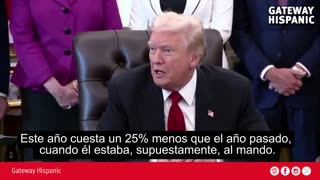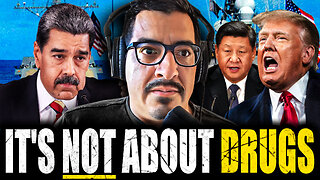Premium Only Content

Álvaro Uribe: A Dangerous Alliance with Maduro's Tyranny
Álvaro Uribe: The binational zone with Maduro is the next step toward creating a Greater Cuba.
Why? Petro, who has done nothing to help those departments, now wants to hand them over to Maduro’s tyranny.
A tyranny that has destroyed Venezuela’s republican democratic institutions.
A tyranny that crushed private enterprise.
A tyranny that has driven out 8 million Venezuelans.
A tyranny that has doubled poverty.
Let’s not forget—this tyranny tried to dismantle the Andean Community.
It seriously harmed the treaty between Mexico, Venezuela, and Colombia.
This tyranny has sponsored terrorists, harbored them.
And now, this handover of three departments to a tyranny...
in an alliance designed to eliminate institutions, rules, justice,
and any way out—just like the communism created by Maduro’s tyranny.
We must reject that binational zone.
La zona binacional con Maduro es el siguiente paso hacia la creación de una Gran Cuba.
¿Por qué? Petro, que no ha hecho nada por esos departamentos, ahora quiere entregárselos a la tiranía de Maduro.
Una tiranía que ha destruido las instituciones republicanas y democráticas de Venezuela.
Una tiranía que aplastó la empresa privada.
Una tiranía que ha expulsado a 8 millones de venezolanos.
Una tiranía que ha duplicado la pobreza.
No olvidemos—esta tiranía intentó desmantelar la Comunidad Andina.
Dañó gravemente el tratado entre México, Venezuela y Colombia.
Esta tiranía ha patrocinado terroristas, los ha protegido.
Y ahora, esta entrega de tres departamentos a una tiranía...
en una alianza diseñada para eliminar instituciones, normas, justicia
y cualquier salida—igual que el comunismo creado por la tiranía de Maduro.
Debemos rechazar esa zona binacional.
La zona binacional impulsada por Nicolás Maduro y Gustavo Petro representa una grave amenaza para la seguridad regional y el Estado de derecho en América del Sur. Aunque se presenta oficialmente como una iniciativa de cooperación fronteriza, diversos analistas y sectores políticos advierten que su verdadero propósito sería facilitar el tráfico de drogas y consolidar el control territorial de redes criminales que operan a ambos lados de la frontera entre Colombia y Venezuela.
Esta región ha sido históricamente una de las principales rutas del narcotráfico en el continente. Una zona binacional sin supervisión efectiva podría convertirse en un corredor libre para el transporte de drogas, armas y dinero ilícito, amparado por estructuras estatales permisivas o incluso cómplices. Además, Venezuela ha sido acusada de albergar y proteger a grupos armados ilegales, como el ELN y disidencias de las FARC, que se financian mediante narcotráfico, extorsión y minería ilegal. La zona binacional podría legitimar su presencia y brindarles apoyo logístico y operativo.
Asimismo, este proyecto pone en riesgo la soberanía colombiana, al permitir que departamentos estratégicos queden bajo la influencia de un régimen como el de Maduro, señalado por violaciones sistemáticas a los derechos humanos, corrupción institucional y colapso democrático. La alianza Maduro-Petro podría formar parte de una estrategia regional para erosionar las instituciones democráticas y reemplazarlas por estructuras paralelas controladas por intereses ideológicos o criminales.
Otro peligro es la pérdida de control judicial y fiscal en la zona. Las fuerzas de seguridad, los sistemas de justicia y los mecanismos de control quedarían debilitados, dificultando la persecución de delitos y favoreciendo la impunidad. En lugar de fomentar el desarrollo fronterizo, esta iniciativa amenaza con consolidar un territorio sin ley al servicio de economías ilegales.
En conclusión, la zona binacional propuesta por Petro y Maduro no representa una integración legítima ni transparente, sino una plataforma para expandir el narcotráfico, fortalecer a grupos armados ilegales y avanzar en un modelo autoritario. Lejos de traer paz o prosperidad, este proyecto profundiza la inseguridad, la corrupción y el riesgo de desestabilización regional. Su implementación debe ser firmemente rechazada o, al menos, sometida a un riguroso control nacional e internacional.
The binational zone promoted by Nicolás Maduro and Gustavo Petro represents a serious threat to regional security and the rule of law in South America. Although officially presented as a cross-border cooperation initiative, various analysts and political sectors warn that its true purpose is to facilitate drug trafficking and consolidate territorial control by criminal networks operating on both sides of the Colombia–Venezuela border.
This region has historically been one of the main drug trafficking routes on the continent. A binational zone without effective oversight could become a free corridor for the transport of drugs, weapons, and illicit money, protected by permissive or even complicit state structures. Additionally, Venezuela has been accused of harboring and supporting illegal armed groups, such as the ELN and FARC dissidents, which are financed through drug trafficking, extortion, and illegal mining. The binational zone could legitimize their presence and provide them with logistical and operational support.
Moreover, this project endangers Colombian sovereignty by allowing strategic departments to fall under the influence of a regime like Maduro's, known for systematic human rights violations, institutional corruption, and democratic collapse. The Maduro–Petro alliance may be part of a regional strategy to undermine democratic institutions and replace them with parallel structures controlled by ideological or criminal interests.
Another danger is the loss of judicial and fiscal control in the area. Security forces, justice systems, and oversight mechanisms would be weakened, hindering the prosecution of crimes and promoting impunity. Rather than fostering border development, this initiative threatens to establish a lawless territory serving illegal economies.
In conclusion, the binational zone proposed by Petro and Maduro does not represent legitimate or transparent integration, but rather a platform to expand drug trafficking, strengthen illegal armed groups, and advance an authoritarian model. Far from bringing peace or prosperity, this project deepens insecurity, corruption, and the risk of regional destabilization. Its implementation must be firmly rejected—or at the very least, subjected to rigorous national and international scrutiny.
-
 0:50
0:50
Gateway Hispanic
15 hours agoTrump celebra la reducción en el costo de la cena de Acción de Gracias
2 -
 1:20:42
1:20:42
The Connect: With Johnny Mitchell
6 days ago $9.74 earnedThe Truth Behind The U.S. Invasion Of Venezuela: Ed Calderon Exposes American Regime Change Secrets
31.5K15 -
 2:10:18
2:10:18
FreshandFit
5 hours agoAfter Hours w/ Girls
123K27 -
 2:06:29
2:06:29
TimcastIRL
11 hours agoAirlines Cancel Over 700 Flights, Travel APOCALYPSE Is Now, Trump Says END FILIBUSTER | Timcast IRL
227K103 -
 9:02:44
9:02:44
SpartakusLIVE
16 hours agoTOXIC Solos on ARC Raiders || Friday Night HYPE - WZ or Redsec Later?
75.7K2 -
 2:15:42
2:15:42
TheSaltyCracker
8 hours agoWoke is DEAD ReeEEStream 11-07-25
121K215 -
 1:29:13
1:29:13
Sarah Westall
7 hours agoThe City of London: Infiltration, Intimidation & Centralized Power w/ Mike Harris
49.1K13 -
 10:14:18
10:14:18
Dr Disrespect
18 hours ago🔴LIVE - DR DISRESPECT - ARC RAIDERS - AGAINST ALL DANGER
200K26 -
 32:09
32:09
ThisIsDeLaCruz
1 day ago $5.78 earnedFalling In Reverse: Christian Thompson’s Stage Tech Revealed
43.6K7 -
 4:41:02
4:41:02
SynthTrax & DJ Cheezus Livestreams
1 day agoFriday Night Synthwave 80s 90s Electronica and more DJ MIX Livestream 80s Night / Late Night Nostalgia
51.3K5